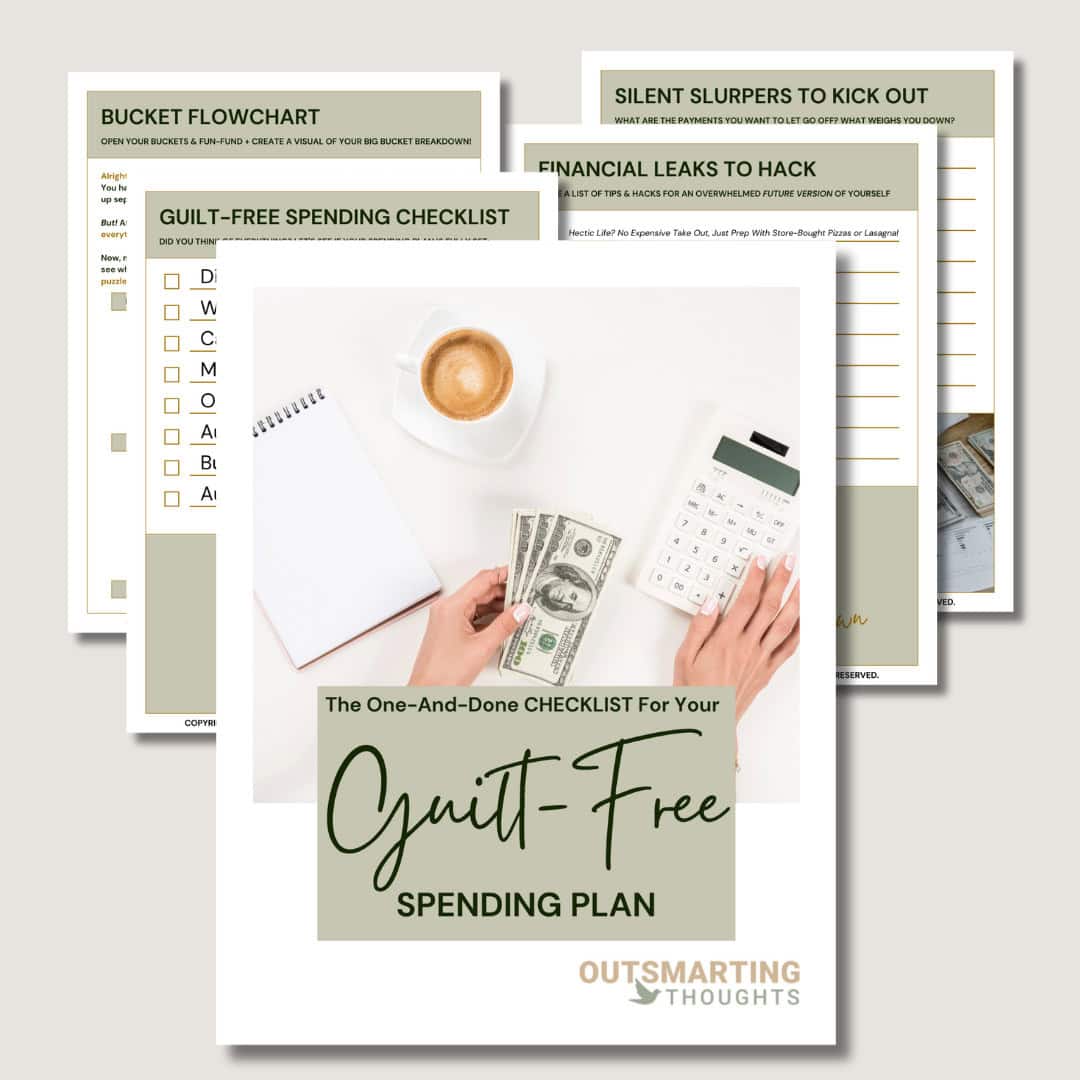Wanna know the effects of impulse buying that nobody really dares to spell out? This post is dedicated to exposing the raw psychological link between impulse buying and desperation.
Let’s not sugarcoat it: if you’ve ever felt the rush of buying something you didn’t plan for, you’ve probably also felt the guilt and self-doubt roundabout that follows. That tug-of-war isn’t about money management; it’s about desperation. When you’re emotionally stuck, that ‘Add to Cart’ moment feels like a lifeline. But the truth? It’s just self-medicating, a quick hit of relief to escape the feeling of being trapped. We overachievers often want to outthink our way out of pain. But when emotions call the shots, you’re not really in full control of your finances. Unfortunately, marketing masterminds know this; and they count on your desperation to make you their ideal customer.
What you’re going to learn is why impulse buying is way more than just careless spending. You’ll see how desperation drives those purchases, why distraction doesn’t heal the wound, and how reclaiming control is your rebellion against an average life & staying small.
After you have learned to spot the real psychology behind impulse buying, you’ll be way more able to pull yourself out of the trap. You’ll feel stronger, more strategically in control, and aligned with the things in life that actually resonate with you.
This post is all about the effects of impulse buying and how they’re linked to desperation, so you can stop being easy prey and start leading your life.
Effects Of Impulse Buying
The psychology behind the effects of impulse buying is simple but brutal: you’re not running your finances; your emotions are. Your brain honestly doesn’t stand a chance when the underlying vibe of desperation kicks in. And it’s not even your fault! When your brain enters a state of desperation, fight or flight, rationality goes out the window on a deep biological neurolevel; Stress impairs your prefrontal cortex, shrinking its capacity for impulse control and thoughtful decision‑making.
Chronic stress can reduce prefrontal cortex volume by up to 20%, making you more susceptible to making impulsive choices as emotion-driven brain regions hijack control. Simpler said, urgency, scarcity, and shiny promises hijack your brain. You’re left feeling broke, powerless, and stuck in a cycle of regret. The real rebellion isn’t saying no to shopping; it’s saying yes to your own self-actualization & developing self-control.
RELATED POST:
Psychological Reasons For Overspending & How To Outsmart Them (Spoiler Alert: It’s Not YOUR Fault!)
When life feels intolerable, impulse buying acts as a quick escape hatch, a shot of relief in moments of despair. But let’s move past fluff & flaky wishful thinking: that so-called relief is nothing more than self-medicating emotional turbulence. Without self-control and without addressing the root wounds, the pattern becomes a ‘desperation loop’ that keeps you stuck. And that’s exactly why marketing masterminds target you.
Impulse Buying Is Truly Desperation in Disguise
Impulse buying is way more complicated than the judgmental ‘just poor money habits’ you usually hear. When you observe the pattern more deeply, it’s way more about avoidance of pain and desperation than anything else. At its core, hopelessness & desperation are about the belief you’re trapped in an intolerable situation and powerless to change it. And when you’re living in that vibrational state, your brain will grab at ANYTHING that feels like an exit.
For many of us, that exit is shopping. That’s why window shopping, scrolling through a store, or swiping your card feels like a breath of fresh air. It isn’t about the garment you gain; it’s about temporary freedom from feeling stuck in powerlessness. About the relief from this average, intolerable life, you are deeply unsatisfied with. And whatever is the cause of this unhappiness, it might even be too painful to look straight into the eyes.
RELATED POST:
Impulse Buying Behavior: 4 Signs You’re Self-Medicating at the Cost of Your Future Self
One of the effects of impulse buying is that the desperate state of being in constant emotional or existential pain (without solving the root cause) keeps you stuck in the loop. The further effect of this is brutal. You don’t just lose money; you lose clear-headed rationality. You train your brain to believe escape is only possible through consumption. The powerlessness affirms itself like a hamster on the wheel. And with every impulsive purchase, you tighten the spider web of hopelessness instead of breaking it. You don’t need more stuff. You need to stop confusing distraction for direction.
The Self-Medication Trap That Backfires
Let’s not sugarcoat it: impulse buying works like a painkiller. That rush of dopamine feels like existential relief, but it’s also a temporary high masking a long-term crash. Distraction has its place and function, as we often promote in our Dopamine Dosing Discipline. But when distraction is roaming wild without being counterbalanced with self-control, it becomes a lifestyle; and so, you’ve kinda built yourself a ‘padded prison’.
The more you medicate your emotional & existential pain and desperation with shopping, the more you fuel the very pain you’re trying to escape. Because eventually, the guilt hits. The self-doubt roundabout spins. And the hopelessness deepens.
The effect here is vicious. Instead of solving the root problem (why you feel powerless), you pile on financial stress and emotional regret. And please, for once, do not fall for the scapegoating belief that you ‘lack character’ or ‘are just bad with money’. You’re not crazy. You’re a normal, decent, feeling human being caught in a feedback loop that rewards you for sabotaging yourself. But here’s what I would like you to consider: you don’t have to keep using dopamine hits as your survival strategy. You can use them strategically, not destructively. Like our Dopamine Dosing Discipline advocates!
Owning a cashflow strategy is a skill that’ll give you some serious advantages in life. I think budgeting is an aligned action with taking life seriously, and I seriously believe life will reward you for it. If you’re not into high-maintenance strategies like ‘tracking your spending’ and just want to sit down ONCE to direct your financial future, our Guilt-Free Spending Plan Printable is the right cashflow strategy for you! Don’t let anybody outsmart you out of your own money and start budgeting today by simply filling out the form below:

Want a free
ONE-AND-DONE CHECKLIST for aGUILT-FREE SPENDING PLAN? Free up your bandwidth and stop overthinking with this
FREE One-And-Done Checklist for your Guilt-Free Spending Plan!
Simply fill out the form below to get this strategy
delivered straight to your inbox!
Marketing Masterminds Love Desperation
Let me get into one of the most devastating effects of impulse buying. Because. You think you’re choosing the sale. But in reality, the sale chose you. When you’re desperate, you become a dream candidate for marketing masterminds. Our whole society is built on consumerism at this moment in time! They understand urgency, scarcity, and FOMO better than anyone. And when you’re already convinced life is hopeless, those tactics don’t just tempt you; they own you.
Hopelessness is like a spider web. The more you struggle against it, the more stuck you get. Marketing feeds off that. Every time you chase a discount or a countdown timer, you’re not just losing money; you’re losing autonomy. You’re proving to yourself that you can’t say no. And nothing cements hopelessness faster than believing you’re powerless.
RELATED POST:
How To Stop Overspending: The Strategy You NEED To Regain Control (Without The Self-Blame Spiral)
The effect is clear. You hand over control not just of your wallet but of your self-control and self-actualization. You’re subconsciously allowing external masterminds to dictate your life while you stay small. But honestly, as an overachiever, staying small was never your style. You’re not here to half-ass your one shot at life. It’s time to rebel.
The Ultimate Hack: Desperation Is Your Rebellion Signal
Here’s the twist: desperation isn’t weakness. It’s a signal. Hopelessness & desperation feel like a spider web because you’re resisting it. I know it sounds somewhat stupid, but what if you saw it as the key to getting out of your powerlessness?
Because, now that you know there is way more going on under the surface, gaining that knowledge makes you able to switch gears, to a more strategic move! Stop fighting the feeling and start listening to it. Investigate it! What is the emotional & existential pain truly about? What can you do to solve it, instead of escaping it? That trapped, powerless energy isn’t proof you’ve failed; it’s proof something in your life is screaming for change.
Impulse buying shows you exactly where the wound is. So try to identify the triggers. Knowledge is power! You don’t need to drown it in another Amazon box. Treat it as your red flag. When you stop numbing, you can finally see the path forward. You can set healthy boundaries, build systems, and choose intentional spending that aligns with what resonates with you instead of what manipulates you.
RELATED POST:
Intentional Spending: The CEO-Mindset And AntiDote Against Overspending & Impulse Buying
The effect of this mindset shift is huge. You move from being easy prey to being CEO of your own life. You stop half-assing existence and start living with kick-ass confidence. It’s not about rebelling against shopping itself, but against staying trapped. And that rebellion? That’s your ticket to a bigger, more aligned life.
Effects Of Impulse Buying (Summary)
The psychology behind the effects of impulse buying is that you’re not in control of your finances; your emotions are. That’s why impulse spending becomes a desperate form of self-medicating. Without self-control and without addressing the root emotional wounds, you’re easy prey for marketing masterminds who thrive on your hopelessness.
What you’ve gained here are tools to recognize the trap: spotting impulse buying as desperation in disguise, breaking the self-medication loop, resisting marketing manipulation, and reframing desperation as your rebellion signal.
Picture yourself six months from now. You’ve stopped handing over your autonomy to every countdown timer. You feel grounded, intentional, and aligned with the life you want, not the one they’re selling you. It’s all within your power.
I wish you the absolute best as you rebel against staying small. You deserve a life you don’t have to escape from. Now go grab it with both hands, because you deserve nothing less.
This post was all about the effects of impulse buying and how they’re linked to desperation, so you can stop being easy prey and start leading your life.
We aim to help you out as much as possible, but please keep in mind that the content is only for general informational and educational purposes. We offer our services based on independent research and life-experience only, and so our strategies can never serve as a substitute for professional advice. Trust me, we do not have 'everything figured out', are all still huge works in progress, but hey, what works for us, might work for you too! This is allll up for you to decide... It might not work for you, and that's okay, so cherrypick the stuff that resonates and leave the stuff that doesn't, and let's go!








